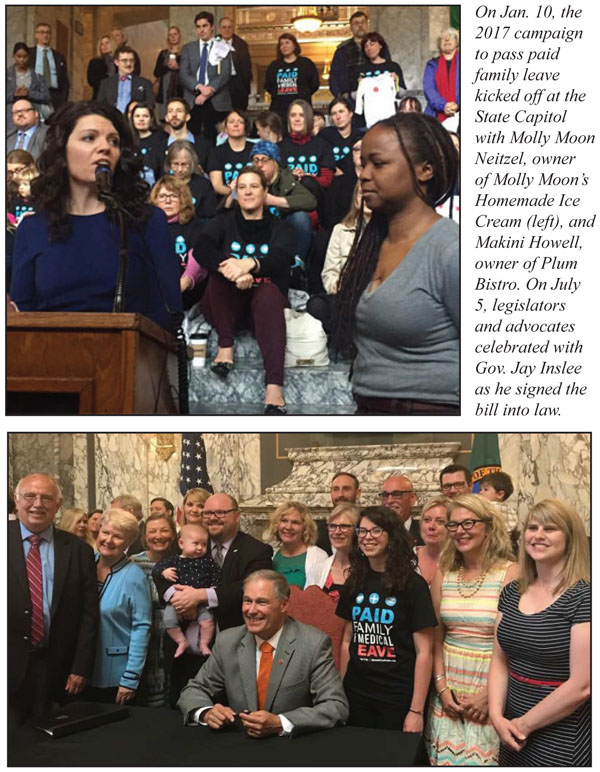OPINION
I-1433 set stage for historic family leave victory
The following story appears in the Washington State Labor Council’s 2017 Legislative Report published in August.
SECRETARY TREASURER’S COLUMN
By LYNNE DODSON
In the midst of a session that demonstrated just how dysfunctional a divided Legislature can be, one amazing thing happened. Washington state passed a paid family and medical disability leave bill that is a model for the nation, and brings us a little closer to the rest of the industrialized world.
Beginning in 2020, working people will be able to take paid time off for the birth or adoption of a child, to take care of an ill family member, when a family member is deployed or wounded in the military, or for their own serious health condition. The new law is progressive in several ways. Twelve weeks of leave generally (with up to 18 weeks in some cases), wages replaced at 90 percent for lower-wage jobs, and employers pay a larger share of the premium than employees. The House voted 65-29 (see Vote #13) and Senate voted 37-12 (Vote #12) to pass SB 5975, and Gov. Jay Inslee signed it into law.

The law was negotiated with labor, community organizations, business, and legislators from both sides of the aisle. But the table was set last year when we passed Initiative 1433, raising the minimum wage and providing paid sick leave. We knew that paid family and medical leave are popular policies, and so did the business community. The specter of an initiative led by labor and community organizations to secure paid family leave motivated business groups to come to the table to help shape the policy. The leverage we had during the negotiations and in securing passage was profound. We learned from I-1433 that when the Legislature fails to pass policies that benefit working people, we can do so through the initiative process.
 We can be proud of the Washington Work and Family Coalition led by Marilyn Watkins of the Economic Opportunity Institute and including the WSLC, UFCW 21, SEIU 1199NW, Teamsters 117, Mom’s Rising, and Legal Voice. Democratic legislators who have long worked for paid leave and business leaders who knew this was their opportunity to influence policy before an initiative, partnered with moderate Republican senators and representatives to push recalcitrant GOP caucus leaders. The result is a huge victory for working people.
We can be proud of the Washington Work and Family Coalition led by Marilyn Watkins of the Economic Opportunity Institute and including the WSLC, UFCW 21, SEIU 1199NW, Teamsters 117, Mom’s Rising, and Legal Voice. Democratic legislators who have long worked for paid leave and business leaders who knew this was their opportunity to influence policy before an initiative, partnered with moderate Republican senators and representatives to push recalcitrant GOP caucus leaders. The result is a huge victory for working people.
The contrast between a difficult, but productive, negotiation for paid family and medical leave and most of the rest of the legislative session is profound. Funding education to satisfy the state Supreme Court’s McCleary decision needed to be a priority. In the end, more money was approved for K-12 education, but the final budget still fell short on fully funding McCleary.
Other education priorities also failed in the divided Legislature. The governor and House Democrats proposed additional funding for the Labor Education and Research Center in their budgets, but Republicans refused. While dozens of well-funded business schools exist, our state’s one labor program is now funded at half the level it was six years ago. Anti-union legislators know the power of labor education, and without additional support, the LERCs capacity is limited.
Our divided Legislature doesn’t work. Republicans’ willingness to shut the state down shows little regard for what public service means. They believe government—which is all of us, and them!—is a bad thing so they undermine it and try to make it ineffective.
We need to elect people to our State Legislature who care about working people and care about small businesses struggling to grow. That means working in our communities to identify and elect pro-worker candidates. In the short term, we have an opportunity to change the dynamics in the State Senate in 2017. The 45th District race needs to be a statewide effort. It’s up to us to make sure our members know which candidates, like Manka Dhingra, want the state’s economy and public services to work for all of us.
 Lynne Dodson is Secretary Treasurer of the Washington State Labor Council, AFL-CIO.
Lynne Dodson is Secretary Treasurer of the Washington State Labor Council, AFL-CIO.
Click here to see more reports from the Washington State Labor Council’s 2017 Legislative Report. Or download the entire 8-page PDF.





